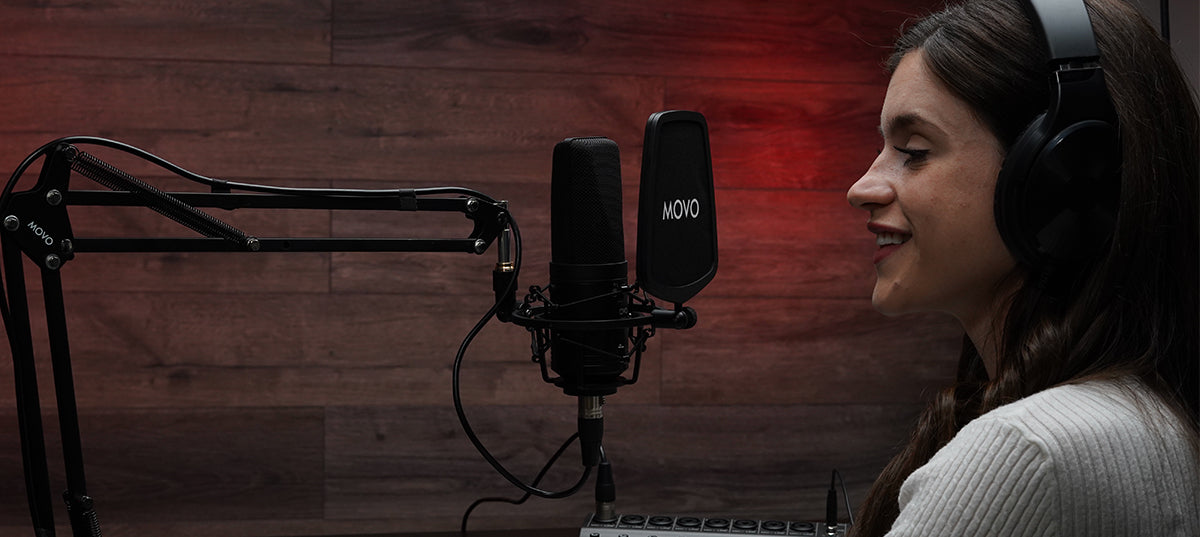Your Cart is Empty
 Free Shipping
Free ShippingEnjoy the convenience of free shipping on all orders. We believe in transparent pricing and delivering value straight to your doorstep. read more...
 30-Day Money-Back Guarantee
30-Day Money-Back GuaranteeShop with confidence knowing you have a full 30 days to try our products. If you're not completely satisfied, return your purchase for a full refund, no questions asked. read more...
 2-Year Warranty
2-Year WarrantyWe stand by the quality of our products with an industry-leading 2-year warranty. Enjoy peace of mind knowing your vlogging and podcasting equipment is covered against defects and issues. read more...
 Lifetime Customer Support
Lifetime Customer SupportOur commitment to you doesn't end at purchase. With lifetime customer support, you can reach out to our expert team anytime for help, advice, or troubleshooting, ensuring you always get the best performance from your gear. read more...

by Tycho Smith April 03, 2020
If you’ve been considering the idea of starting your own podcast, you probably have a few podcasts that you already admire and hope to emulate in some way. Most people discover a few favorite shows and pull inspiration from the way that these episodes are formatted, how the hosts lead interviews or just the general chemistry between the hosts. These are all elements of a podcast that you can learn how to master and implement them into your own show with the right podcast equipment. Before you begin recording, you need to consider your speaking voice and how to control it. You may not think much about this during your everyday life, but if people are listening to a recording of your voice, it needs to be more pronounced and probably slowed down a bit from your normal talking voice. Here are some tips on how to practice speaking before you hit that record button.
The best way to nail all of your lines for your show is to have a plan of what you will say throughout the episode. Writing a podcast script for each episode will help to keep you organized, focused on the topic on hand and help with transitions between segments. However, don’t feel as though you absolutely must stick to everything that the script says. Adding in normal reactions and side stories is what will make your show flow and seem more like a natural conversation between people. The script is merely meant to guide the show. Before recording, spend time reading through the script to practice volume, enunciation and speed.
If you’re going to be hosting a show that conducts interviews with guests, there is quite a bit of planning that should go into your research for interview questions. First, consider who your guest is and what is most interesting about him or her. Are they an expert on some subject? Are they famous? What is it that people want to know more about this person? Then, do your own research about their life and experiences so that you can ask more in-depth, thought-provoking questions. Once you have your questions outlined, you’ll have an easier time letting the conversation flow freely between you and your guest. During an interview, new questions will naturally arise, giving the conversation a more natural feel, but these initial planned questions will make the entire experience easier for everyone involved.
Most of us are not used to being recorded—and listening to recordings of ourselves played back. Everyone knows that feeling of hearing your voice on an answering machine and thinking, “Oh no, is that really how I sound?” It’s difficult for us to hear our own voice in the way that others do, and it’s a very common feeling. But, because of this disconnect, it can be tough to control your voice while using podcast equipment. You need to ensure that you’re speaking in a way that is clear for the audience. Oftentimes, we speak much faster than we mean to, especially in situations where we feel under pressure such as while recording a show or doing a presentation. Practice slowing down your regular speech and allow a greater level of clarity for your audience. You may even want to record yourself a few times to identify which tempo is right.
It may not feel like a natural way of speaking, but when you add purposeful pauses into your podcast voice, it will create an interesting effect. If you are speaking too quickly or rushing from one point to the next without time to rest in between, your audience will struggle to keep up and may not have the time to think about what you are saying. When you insert pauses at the right moment, your listeners have the chance to really consider your point and think more deeply about it. In regular speech, we often avoid pauses and tend to fill the silence with words like “um” because pauses in conversation can make you uncomfortable. With a podcast, understanding how to use these pauses is vital to engaging with your audience.

Creating your very own podcast is a rewarding project and could potentially even turn into a lucrative business venture. But, before you can start dreaming big, you need to have the right tools and materials like podcast equipment and the diligence to plan your shows. Take the time to write scripts and interview questions and then practice your breathing, pauses, speaking volume and enunciation before you press record on the first official episode. When running a podcast, your voice is your character, so it’s important that you have a great deal of control over the way that you speak.
We’re a team of creators and entrepreneurs who proudly support the content creation community through innovative, high-quality products that let you do you. From filmmakers to photographers, vloggers to podcasters, and beyond, Movo helps you share your creative voices across countless mediums and content platforms everywhere.
Receive access to exclusive deals, updates, and more.
